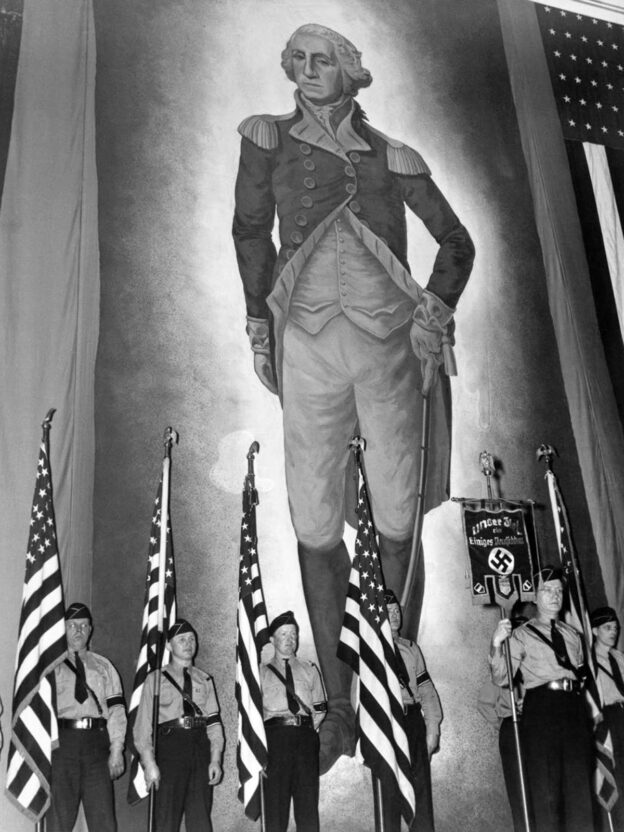A piece I wrote about the misuse of the American flag was published by NBC-THINK on Flag Day, earlier this week. It can be read here.


A piece I wrote about the misuse of the American flag was published by NBC-THINK on Flag Day, earlier this week. It can be read here.

I have defended Congresswoman Alexandria Ocasio-Cortez on a number of occasions in several public venues. But I was chagrined by her reaction to the recent Hamas/Israel war, and express why here.

My most recent Ami column can be read here.

Marijuana legalization in an increasing number of states has yielded some panic and some nonchalance. Neither is really warranted, in my opinion, and you can read why I feel that way here.

A rejoinder to the posting below, “The Cat is a Hat,” was sent to me by our son Menachem Tzvi, who lives with his wife and three children in Lakewood, NJ and studies full-time in a kollel there (but who apparently uses his very limited “down time” to write not only perceptive divrei Torah but occasional doggerel).
While your poem was truly
a lesson in grammar,
It gave me a jolt-
made me stutter and stammer.
I am so shaken up-
yes it’s true, I’m afraid
The words that I read
left me shocked and dismayed.
The foremost offense
is the honor you gave
To a man who committed
injustice so grave.
He penned and he drew
racist words and depictions
Just to sow and to spread
xenophobic afflictions!
And then, as I read
my surprise was fantastic
I was simply befuddled
My flabber was gastic!
Humans, you said
deserve phrases and words
that could not apply
to apes, mammals and birds!
And if that’s not enough
you implied with great ease
that he’s are for men
and that women are she’s!
And on that note I add
that I quite was amused
with how all of your rules
leave us dumb and confused!
For what shall we say
to potatoes with limbs-
especially now
they are not hers or hims?
Should we use the word “who”
Or perhaps just a “that”?
And what, who or whom
Is the cat in the hat?
But alas, now I fear
that none of this matters
with our basic core values
thus shredded, in tatters.

In belated honor of Theodore Geisel’s birthday yesterday, I offer you a piece I wrote, under a pseudonym, for Ami Magazine years ago, about a grammatical gripe, but in homage to the good “Doctor”:
It’s too much overheard
And too much to endure.
Many words are misused
And misplaced; that’s for sure.
But there are words so simple, so common, so plain
That confusing them causes us terrible pain.
They grate on the ear, they bother the head,
They set teeth on edge, and up make us fed.
A THING is a THING, and a person is not.
He’s a man, that is, or a woman or tot.
A thing is a thing, like a cat (or a hat)
And the right word to use for such things is, well, “that.”
So it’s: “The hat that was sat upon ran out of luck.”
Or, likewise, the “cat that challenged a truck.”
You would never refer to a hat as a “who.”
Or a cat for that matter, or a cow… or a moo.
“Who” is reserved for beings quite human,
Not for feelings or furniture, cabbage or cumin.
Even elephantine Horton who heard a clear who
Does not himself merit one, as do I and do you.
For an animal or object, “who” is atrocious.
“Who” is for you, reader, adult or precocious.
So please, no more “the person that came to my house”
Or “the lady that screamed when she spotted a mouse.”
No more “neighbors we hear that are going on vacation”
Or “children that come from Haiti are Haitian.”
No more “Zaidy, that is with computers a novice.”
Or “Zeldy that’s coming to visit on Shabbos”
It’s WHO in such cases, since a person’s a person
Our use of English must improve and not worsen.
If we aim not to seem entirely dumb.
It’s “Who” for those of opposable thumb
Excepting simians, of course, that’s quite certain;
Monkeys get “that,” like a lampshade or curtain.
But we humans are different; get this down pat!
We take a “WHO”—And that is just that.

My Ami Magazine column last week dealt with several lawsuits that have been in the news of late. It can be read here.

Rabbi Avi Shafran
One would have been forgiven for assuming it an elaborate Purim joke. In fact, assuming otherwise would have strained credulity.
But credible, unfortunately, it is. “It” — a new glossy magazine I prefer not to name, aimed, its marketing team says, at Jewish “men age 25-65 from the right and the left who are Conservadox, Modern Orthodox or Yeshivish; and live in Flatbush, Lakewood, the Five Towns and Bergen County” — is apparently all too real, a crazy cartoon come to life.
The new periodical is for you. If, that is, you “are enthralled by men’s luxury and higher end products.” If so, the mag “has it all covered for you,” focusing on “all fine goods in the consumption industries for Jewish men,” from “an old fashion [sic] to bourbon or wine.” And, of course, cigars, grilling, cars, cologne, man caves and fancy watches.
And there will be photos! Of “first class dining, men’s hobbies & lifestyle,” depictions that will “captivate our readers [sic] attention for their elegant experience,” whatever that is supposed to mean.
An article in a Jewish newspaper about the new offering helpfully informs readers that “Sure, you have your chavrusas, seforim and shiurim,” but you need help to “make the best use of your precious free time, with premium content by experts in their fields about the rewards that come after a hard week of work and learning.”
Maybe it is a Purim shtick.
No, I checked again. It’s not.
Something is rotten in the state of Orthodox-ish. The “ish” is indicated because hedonism is as mixable with authentic Orthodoxy as cool spring water is with grease dripping from a succulent steak on a high-end barbeque grill.
Interestingly, in response to the ongoing Covid crisis (and thankfully unaware of the magazine’s debut), the members of Moetzes Gedolei HaTorah recently issued a call to the Jewish community to recognize that the crisis’s challenges and tragedies should be regarded as “an appeal from Heaven to correct our ways,” in particular with regard to “a fundamental and broad point.”
The point? That “Klal Yisroel is a ‘nation of princes and a holy people’.” And that Jews must, as a result, “distance themselves from the pursuit of excess.”
“There are among us,” the call to sensitivity continues, “those who, notwithstanding their care with mitzvos, pursue fine foods and expensive vacations; they boast of their clothing and furniture,” people who are not exclusively focused, as Jews should be, on living “a modest life centered around Torah, service to Hashem, and kindness to others; a life purposed on being close to Hashem.” Who ignore the “spiritual danger” of “a life of materialism.”
There are, to be sure, occasions when somewhat “fancy fare” may be excusable, for the enhancement of simchos and such. There are even times when we might need to pamper ourselves in order to revive our emotional energies, when treating ourselves to a special treat helps us to better serve Hashem bisimcha. But elevating luxury to an ideal, putting hedonism on a pedestal? Ugh.
The Moetzes members’ call will probably strike the new magazine’s machers as wildly preposterous, even insane. Just like the glassy-eyed fellow with the tin foil hat walking down the street mumbling to himself about Martians thinks everybody else is deranged.
As it happens, though, the Moetzes statement should stimulate introspection in the rest of us, too, we who don’t salivate at the prospect of a good bourbon or fine cigar. We may not be “enthralled by… luxury and higher-end products,” but can we say we haven’t drifted a bit from modesty toward excess ourselves?
Things that once were extravagant luxuries have bizarrely morphed into “necessities.” Larger and more elaborate homes than we really need testify to such change (not to mention that they draw resentment from others). The sort of cars we drive, the type of vacations we take, the foods and drinks we consume, the size and elaborateness of the simchas we host (something the current health crisis has in fact taught us are unrelated to true simchah) — all point to an imbalance in priorities.
Even, at least in some places, rewards given to talmidim and talmidos by rabbaim and moros have become extravagant; stars on charts and small tchotchkes no longer cut the mustard (even our mustard doesn’t anymore, having yielded to gourmet condiments).
Some candymen in shul have reportedly also felt the need to “upgrade” their offerings, lest the youngsters find more rewarding places for worship (or whatever).
Rewarding deserving children is undeniably important, yes, but so is teaching them about limits.
It’s a truth universally acknowledged in principle but increasingly ignored in practice: Even in times of plenty and even for the financially fortunate, there is dignity in modesty.
And the opposite in the opposite.
© 2021 Agudath Israel of America

Two people dear to me — a talmid from a former lifetime and a respected colleague in my current one — forwarded me links to an outrageous set of comments attributed to Texas State Representative Terry Meza, explaining her proposed bill to change parts of her state’s code about the use of force in self-defense.
Ms. Meza’s bill was characterized as a repeal of Texas’s “castle doctrine,” a catch-all phrase for an assortment of laws in various states offering a person the right to use deadly force on an intruder.
She was quoted as justifying her effort by contending that “Thieves only carry weapons for self-protection and to provide the householder an incentive to cooperate,” that “in most instances the thief needs the money more than the homeowner does” and that “on balance, the transfer of property is likely to lead to a more equitable distribution of wealth.”
The outrageousness of that report is equaled only by… well, its falsity.
It turns out that the bill at issue simply added a clause requiring a person not on his own property and not personally threatened to retreat rather than shoot to kill someone engaged in a robbery.
And the quotes? They were fabrications, the work of a satirical website.
Neither of the people who sent me the untrue item — which appeared widely on social media — is gullible. One is a doctor, the other a lawyer.
But their assumption of the item’s veracity highlighted something unsettling, even dangerous, that has been steadily increasing and particularly apparent in recent years: the proliferation of “fake news” — and the challenge of distinguishing fiction from fact.
With the presidential election now blessedly in the rear-view mirror, the subject of misleading reportage and opinion writing can be addressed, one hopes, dispassionately. And so, for what it’s worth, I’d like to share some advice about how to best ferret out facts from falsehoods and formulate informed opinions.
The only college I attended was Ner Israel Rabbinical College, but my professional life over the past quarter century-plus has included closely monitoring news. And I’ve confirmed — stop the presses! — that journalists, like all people, have biases. The best among them work to suppress their prejudices, but the preconceptions are often evident all the same, if not on the lines, then between them.
Ditto with news organizations, and kal vachomer with social media. Which means that, in a way, all news is “fake” — if not necessarily like the blatantly misleading example above, then at least in the sense of… slanted.
So what’s a news consumer to do? I suggest something simple, if puzzlingly seldom done: Hear out disparate claims and do independent research.
That means consulting not only Fox News and the Daily Caller, but the New York Times and CNN; listening not only to NPR but to Rush and Sean and even Rudy. And then — most important — employing critical and objective thinking (and tools like Snopes and FactCheck).
People who proudly proclaim that they trust only this or that news source are proudly proclaiming that they don’t really care about truth, only about keeping the bubbles they inhabit intact. The only way to establish facts and formulate educated opinions is to hear different voices. Doing otherwise is like a judge hearing out only one litigant and then rendering a decision.
Sometimes due diligence and hearing all views will yield confirmation of one’s own original gut feelings. Other times, though, an honest person will find his own preconceptions to have been successfully challenged. And so, it’s important here to remember, as it is in life in general, that admitting a mistake is simply declaring that one is smarter than he was earlier.
Objective evaluation of disparate sources can still yield different conclusions for different people. There can be, and often are, entirely legitimate differences of informed opinion. But opinions need to be based on fact, not partisan propaganda or someone else’s biases.
As I was writing this, yet a third person dear to me forwarded a headline from a “frum” medium. It read: “JOE’S MATH: Biden Talks Of 300 Million Vaccines For 200 Americans.” At one point in a recent address, Mr. Biden said “300 Americans” and then corrected himself and said “300 million Americans.” The video on the “news” medium was not only doctored to omit that real-time correction but clumsily edited to make Mr. Biden seem addled.
How many viewers of the fake video, I wonder, cared to consult the original?
© 2021 Ami Magazine

It takes an impressive degree of repugnancy for a Republican lawmaker to evoke condemnation from Senate Minority Leader Mitch McConnell. Enter newly elected Representative Marjorie Taylor Greene of Georgia.
She earned that dishonor by doing things like suggesting that no planes hit the Pentagon on 9/11, claiming that horrific school shootings were staged “false flag” operations and asserting that the Clintons are mafioso-style murderers. She also posted the first “like” on a social media assertion that “Mossad was on the ground on in [sic] Dallas on 11/22/1963!” (Lee Harvey Oswald, a member of the tribe? Who knew?)
Not to mention her sharing of a video asserting that “Zionist supremacists” are conspiring to flood Europe with migrants in order to replace its white population; and her wistful musing that “a bullet to the head [of House Speaker Nancy Pelosi] would be quicker [than removing her through democratic means].”
And her suggestion that California’s deadliest wildfire was caused by “lasers or blue beams of light” shot down from outer space, likely with the involvement of operatives of the “Rothschild Inc, international investment banking firm.”
You get the idea.
Yet, despite Mr. McConnell’s characterization of Ms. Greene’s “loony lies and conspiracy theories” as a “cancer for the Republican Party and our country,” the crackbrained Congresswoman would only tiptoe back her 9/11 and school shooting charges, stonewalling about all else.
Her sole defense seems to consist of the praise she’s received from former President Trump (like his congratulatory tweet after her election win: “Marjorie is strong on everything and never gives up – a real WINNER!”). Well, yes, definitely, a real winner.
Last Thursday, the House voted 230-199 (11 Republican members voted with the Democrats)
to remove Ms. Greene from her committee assignments (Education [!] and Budget). The next day, she finally uttered the word “sorry,” but only for “all those things that are wrong and offensive,” without further specification.
But her outrageous imaginings, with the “Rothschild Inc.” lasers (Lazers?) from outer space, “Mossad” and “Zionist supremacists” references (and others about George Soros, who, like “Rothschild,” is, among neo-Nazis and other moral misfits, a stand-in for Jews), are a reminder of how frequently conspiracy theories point to… you know who.
From the ancient Egyptians fearing an Israelite overtaking of their land to the less-ancient Greek orator Apion, who explained how Jews engage in human sacrifice and cannibalism, to the Christian blood libels of the Middle Ages, to the Protocols of the Elders of Zion, which “exposed” the Jewish plot to manipulate governments and dominate the world, to the Nazi canards about Jews, to those popular in some Muslim circles today, Jews have been prime objects of an odious assortment of frightful fantasies.
According to Mark Potok of the Southern Poverty Law Center, “Conspiracy theories are the way weak minds deal with complex situations.” Granted. And by their very nature, conspiracy theories need conspirators. But why the Jews?
Political scientist and historian Dan Cassino says Jews have so often been blamed for all manner of misfortune because “There is a perception of Jews as the Other — a part of society, but still somehow foreign. Couple that with resentment over Jewish success in certain areas of society, and they’ll be blamed for things that are otherwise just ineffable.”
But there are other ethnic and racial and religious groups that also stand apart within larger societies and, while some are disliked and even attacked by bigots, none are characterized as some sort of diabolical cohort bent on destroying all that is good and righteous. Blacks may be hated and Koreans envied by parts of America’s underbelly. But there has never been a “Protocols of the Elders” of Nairobi or Seoul.
No, the vilification suffered by Jews is sui generis, one of a kind, unexplainable by any normative analytical construct. It is rooted in something residing in a realm beyond the reach of social science.
“Rabi Shimon bar Yochai said: ‘It is a halachah well-known that Esav hates Yaakov” (Sifri, Beha’aloscha 69).
Rav Menachem Ziemba, Hy”d, reportedly addressed the odd use of “halachah” in that statement by noting that Rabi Shimon generally perceives ta’ama di’kra, the reason or logic behind things the Torah says. Here, though, said Rav Ziemba, the tanna contends that when it comes to hatred for Jews, there is no logical explanation. It is simply a halachah, a truth, as inexplicable as it is inescapable.
There will, in other words, always be Esavs in the world, and they will always seek, even in the most deranged ways, to vilify the progeny of Yaakov.
© 2021 Ami Magazine